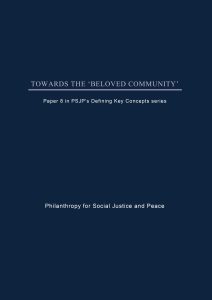This paper is based on two online sessions organised by Philanthropy for Social Justice and Peace (PSJP) with 34 participants representing a diverse cross-section of civil society organizations. Discussions were stimulated by three main presenters:
paper is based on two online sessions organised by Philanthropy for Social Justice and Peace (PSJP) with 34 participants representing a diverse cross-section of civil society organizations. Discussions were stimulated by three main presenters:
- Afsan Bhadelia PhD, Department of Global Health and Population, Harvard T.H. Chan School of Public Health, USA (As of August 2022: Department of Public Health, College of Health and Human Science, Purdue University, USA);
- Leah Odle-Benson, The Stephen Lewis Foundation, Canada; and
- Stephen Connor PhD, Worldwide Hospice Palliative Care Alliance (WHPCA), USA.
The discussions took place in the throes of COVID and focused on learning from each other about difficult issues including dying, trauma, bereavement, and healing. These topics touch us all, but we find few spaces to talk about them. As we deal with the intersecting problems of the legacy of COVID, growing polarization, and ever more war, we need a paradigm shift in how we provide help. This includes the way that a community responds to its members, and how can we foster the idea of compassion in development work.
For each of the presenters, compassion was more than a human impulse. Their work lay squarely at the intersection of care and justice and demanded compassionate action. This paper offers slightly amended forms of their presentations from the dialogues and draws on the ensuing discussion. It suggests that we need to put compassion towards the top of our agenda if we wish to alleviate individual and collective suffering. The paper is divided into four parts:
- Understanding suffering
- Strategies for building compassionate communities
- Care and justice
- The idea of compassion in development
Underpinning the paper is the question, can we build the ‘beloved community’ as the ultimate expression of the systemic transformations we seek in the world today?
The research and work of the three provocateurs and the dialogue process with the participants provide an understanding of the inequities of wealth, race, geography, and gender (among others) that underpin suffering, and of the ways of addressing avoidable suffering. It examines the values (through the palliative care framework) that foster compassionate communities and begins to shine the light on some of the elements of compassionate action in development and philanthropy through the work of the Stephen Lewis Foundation and other participants in the virtual sessions.
Though some time has elapsed since these conversations took place, we believe that their content is as pertinent as ever. Given the polycrisis that we face today, the need for compassion has seldom been greater or more urgent. Our hope is that this paper will evoke more thoughtful reflection and sharing of practices that foster the idea of compassion in our work. To engage write to us at chandrika@global-dialogue.org.
This paper is published by PSJP and co-authored by Stephen Connor, Afsan Bhadelia, Leah Odle-Benson, Barry Knight and Chandrika Sahai.